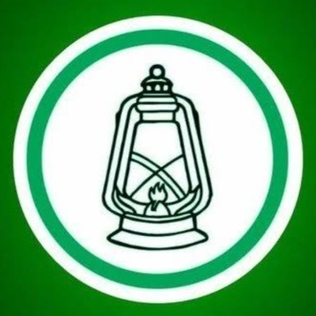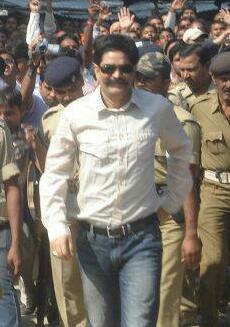
The Rashtriya Janata Dal is an Indian political party, mainly based in the state of Bihar. The party was founded in 1997 by Lalu Prasad Yadav.

The Jatiya Sangsad, often simply referred to as Sangsad and also known as the House of the Nation, is the supreme legislative body of Bangladesh. The current parliament of Bangladesh contains 350 seats, including 50 seats reserved exclusively for women. Elected occupants are called members of Parliament, or MPs. The 12th national parliamentary election was held on 7 January 2024. Elections to the body are held every five years, unless a parliament is dissolved earlier by the President of Bangladesh. On 6 August 2024, President Mohammed Shahabuddin dissolved parliament after the resignation of Sheikh Hasina and ordered to form an interim government.

Hussain Muhammad Ershad was a Bangladeshi military officer and politician who served as the president of Bangladesh from 1982 to 1990.

Shahabuddin Ahmed was a Bangladeshi politician who served as the president of Bangladesh from 1996 to 2001, and the chief justice of Bangladesh from 1990 to 1995. He previously served as the acting president during 1990–91 when Hussain Muhammad Ershad resigned from the post. He headed an interim government and held a general election in February 1991.

The Jatiya Party (Bengali: জাতীয় পার্টি, romanized: Jatiyo Party, lit. 'National Party'; JaPa or JP(E)) is a political party in Bangladesh. The current chairman of the party is Ghulam Muhammed Quader. On 3 January 2019, the party announced its decision to join the Bangladesh Awami League-led Grand Alliance after having been in opposition for the previous parliamentary term. However, the party backtracked the next day and announced that it intended to remain part of the opposition.

Moudud Ahmed was a Bangladeshi lawyer and politician. He was a standing committee member of the Bangladesh Nationalist Party. Ahmed was elected as a Jatiya Sangsad member five times from the Noakhali-1 and Noakhali-5 constituencies.

Shahabuddin Ahmed is a Bangladeshi painter. He was awarded the Chevalier De L'ordre Des Arts Et Des Lettres by the Ministry of Cultural Affair and Communication of France in 2014. He was the recipient of Independence Day Award by the Government of Bangladesh in 2000. His paintings are displayed in galleries like Olympic Museum, Lausanne, Switzerland, Municipal Museum of Bourg-en-Bresse, France, Seoul Olympic Museum, South Korea, the National Taiwan Museum and Bangladesh National Museum.

Muhammad Shahabuddin was the 3rd Chief Justice of Pakistan, serving from 3 May to 12 May 1960. He also served as acting Governor of East Bengal from 22 December 1954 to 14 June 1955.

Mohammad Shahabuddin was a politician and former Member of Parliament from the Siwan constituency in the state of Bihar. He was a former member of the National Executive Committee of the Janata Dal and the Rashtriya Janata Dal. Shahabuddin was disqualified from contesting elections following his conviction for the kidnapping and disappearance of Chote Lal Gupta, an activist of the Communist Party of India (Marxist–Leninist) Liberation for which he was serving a life sentence. He was also accused of killing 15 other Communist Party activists, including the former student leader Chandrashekhar Prasad.
2001 (MMI) was a common year starting on Monday of the Gregorian calendar, the 2001st year of the Common Era (CE) and Anno Domini (AD) designations, the 1st year of the 3rd millennium and the 21st century, and the 2nd year of the 2000s decade.
1997 (MCMXCVII) was a common year starting on Wednesday of the Gregorian calendar, the 1997th year of the Common Era (CE) and Anno Domini (AD) designations, the 997th year of the 2nd millennium, the 97th year of the 20th century, and the 8th year of the 1990s decade.
1996 (MCMXCVI) was a leap year starting on Monday of the Gregorian calendar, the 1996th year of the Common Era (CE) and Anno Domini (AD) designations, the 996th year of the 2nd millennium, the 96th year of the 20th century, and the 7th year of the 1990s decade.
1995 (MCMXCV) was a common year starting on Sunday of the Gregorian calendar, the 1995th year of the Common Era (CE) and Anno Domini (AD) designations, the 995th year of the 2nd millennium, the 95th year of the 20th century, and the 6th year of the 1990s decade.
1994 (MCMXCIV) was a common year starting on Saturday of the Gregorian calendar, the 1994th year of the Common Era (CE) and Anno Domini (AD) designations, the 994th year of the 2nd millennium, the 94th year of the 20th century, and the 5th year of the 1990s decade.
1990 (MCMXC) was a common year starting on Monday of the Gregorian calendar, the 1990th year of the Common Era (CE) and Anno Domini (AD) designations, the 990th year of the 2nd millennium, the 90th year of the 20th century, and the 1st year of the 1990s decade.

Gurudayal Government College or Gurudayal College is a public tertiary higher education institution. It is affiliated with the National University in Bangladesh. The college is located in Kishoreganj, Bangladesh. The college was founded in 1943.
An interim government led by the Shahabuddin Ahmed ministry was formed on 9 December 1990 in Bangladesh, following President HM Ershad's resignation on 6 December in the face of a mass uprising against his regime. Shahabuddin had taken office as the acting president of the country after he was unanimously agreed upon by the leaders of all political parties to be ceremoniously appointed by Ershad just before resigning as vice-president in place of Moudud Ahmed. He administered the oath of office to his council of advisers at Bangabhaban on 9 December 1990. During this period, he gave back freedom of the press by amending a number of law including the Special Powers Act.

The Vice President of Bangladesh was the second highest constitutional office in Bangladesh when the country was governed under a presidential system. The vice-president was the first person in the presidential line of succession, in the event of a president's resignation, removal or death. The post was held by several Bangladeshi statesmen during different periods of the country's history. The inaugural office holder was Syed Nazrul Islam during the Liberation War and the final office holder was Moudud Ahmed before and during '90's Mass Uprising although Chief Justice Shahabuddin Ahmed was ceremoniously appointed on demand to the office by Ershad replacing Moudud Ahmed, so that Shahabuddin could constitutionally become acting president following Ershad's resignation in 1990. Abdus Sattar was the only vice-president to succeed to the presidency in 1981.
2022 (MMXXII) was a common year starting on Saturday of the Gregorian calendar, the 2022nd year of the Common Era (CE) and Anno Domini (AD) designations, the 22nd year of the 3rd millennium and the 21st century, and the 3rd year of the 2020s decade.

Justice Shahabuddin Ahmed Park or in short Shahabuddin Park, is an urban park located in the Gulshan 2 area of Dhaka, Bangladesh. In 2008 the lake was named Shahabuddin Ahmed lake, around which the park was founded in 2020 on a 9.45 acres (3.82 ha) of land. The park was named Justice Shahabuddin Ahmed Park after the former Chief Justice and President of Bangladesh, Shahabuddin Ahmed. The park houses a small gym, a bookstore, a prayer room and a cafe with indoor and outdoor sitting arrangements. The park was a part of the Green Dhaka campaign, in which the main pond was cleaned and various trees were planted; this renovation cost €500,000–2,000,000.
















